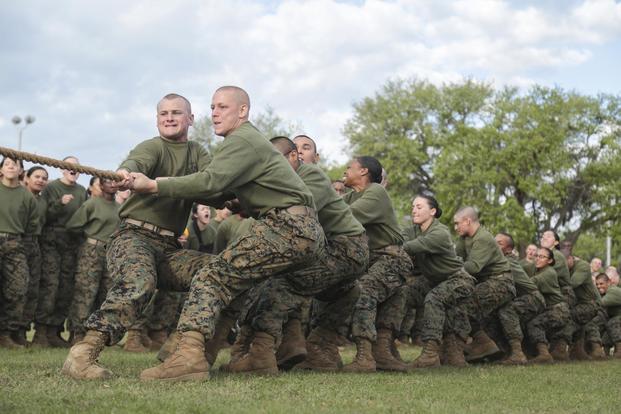National Commission Says Expand Draft Registration to Include Women
 By Edward Hasbrouck / Resisters.info / COMD -
By Edward Hasbrouck / Resisters.info / COMD -
On March 25, the National Commission on Military, National, and Public Service (NCMNPS), after a three-year charade of stage-managed and largely one-sided public events accompanied by closed-door meetings and negotiations among the members of the Commission, released its final report. It recommends that Congress amend the Military Selective Service Act to require that young women, as well as young men, register for the draft when they reach age 18, and inform the Selective Service System each time they change their address until their 26th birthday.
The Commission's recommendations with respect to Selective Service registration are such a naïve fantasy, completely unfeasible and with no foundation in research or reality. The Commission kept its head firmly in the sand, carefully avoiding any inquiry into whether or how the current (unenforced and widely violated) registration requirement for men, much less an expanded registration requirement applicable also to women, could be enforced.
In the report’s 255 pages, there's no mention at all of compliance or noncompliance with draft registration. There's been no audit of the registration database since 1982, and the Commission didn't conduct or ask for one.
The Department of Justice is, and would remain, responsible for enforcement of the registration requirement; but nobody has been prosecuted for non registration since 1986, and in the years that have followed, the DoJ has made neither any estimate of the numbers of violators nor any plan or budget for how to identify, investigate, find, arrest, prosecute, or incarcerate them.
A preliminary report the NCMNPS received from the Department of Justice didn't mention enforcement, and the Commission didn't bother to follow up with the DoJ about the omission. The Commissioners went to extreme lengths to avoid asking any questions about compliance, noncompliance, enforcement, or feasibility, because they knew that even cursory research into these questions would make clear that draft registration of men has failed, and that trying to register women would be even more of a failure.
According to a statement from peace and antidraft organizations and activists, including antiwar feminists:
The issue is not whether women should have to register for the draft, but whether the government should be planning or preparing to draft, anyone.
Congress should end draft registration for all, not try to expand it to young women as well as young men.
H.R. 5492 [introduced by representatives Peter DeFazio and Rodney Davis] would end the current contingency planning for a future draft as well as draft registration, and would end all sanctions against those who didn't register. That's the appropriate choice for Congress and the American public.
The NCMNPS was directed by Congress to consider the "feasibility" of any draft. But registering or drafting women would not be feasible in the face of the likely widespread noncompliance. Women and men will join in resistance to any attempt to expand draft registration, or plans for a draft, to women.
Draft registration for men failed: criminal enforcement had to be abandoned decades ago in the face of pervasive noncompliance. Even the former Director of the Selective Service System testified to the NCMNPS that the current Selective Service System database is "less than useless" as the basis for a draft. Trying to draft women or get them to register to be drafted would be even more of a fiasco.
Congress is under no legal obligation and has no deadline to consider the recommendations made today by the NCMNPS. But if Congress does nothing, draft registration is likely to be ended before long by court order. So Congress is likely to consider both the Commission's recommendations and the alternative of H.R. 5492 either later this year or at the latest in 2021.
The issue isn't likely to come to head in Congress for months, but it's important to start mobilizing opposition and raising awareness now that this debate is going to happen. The government doesn't readily admit failure or acknowledge that the willingness of the people to comply with its orders places limits on what it can do. The decisive factor is likely to be whether, when the time comes for Congress to vote on whether to end draft registration or extend it to women, members of Congress see sufficient visible evidence that young women -- as young men have done, but probably in even larger numbers -- will resist if the government tries to draft them or get them to register to be drafted, and that many older people will support them in that resistance.
Source: http://comdsd.org/index.php/articles-archive/232-national-commission-report







